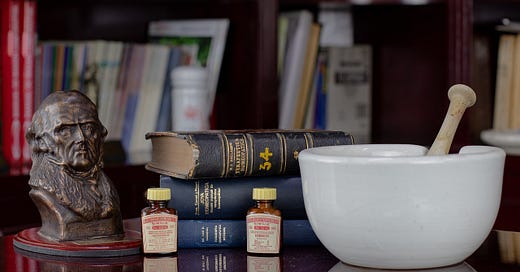“Homeopathy cures a larger percentage of cases than any other form of treatment and is beyond doubt safer and more economical.” ‐ Mahatma Gandhi
Homeopathy is a system of medicine that has no known side effects, is very gentle on the body, and is affordable.
It is what most of us assumed we were getting when we went to the doctor.
Homeopathy is a unique and established system of medicine. It is not naturopathy, or home remedies, or herbalism, or energy work, or supplements.
It’s not magic, it’s medicine. It is natural, safe, no suppressions, (no animal testing), and yet has a history of uprooting even the most entrenched problems.
Homeopathy is a scientifically-proven theory first introduced by Dr. Samuel Hahnemann in the late 1700s.
The law that backs homeopathy is the Law of Similars (or like cures like), which actually goes back as far as Paracelsus, though he never developed this into a system of medicine.
This Law of Homeopathy states that any substance which can cause symptoms in a healthy person can also heal the same symptoms in people who are not well, especially when the substance has undergone the process of dilution, succussion and potentization.
It is through dilution and potentiation that we minimize the harm and harness the curative power of substances.
Some today might call it nano or quantum medicine.
The American Institute of Homeopathy (AIH), established in 1844, was the first physician’s organization in the United States.
The only monument to a doctor in Washington, DC is to Samual Hahnemann, the founder of Homeopathy.
The FDA has been regulating homeopathic medicines since 1938.
The first double-blind, placebo-controlled trials were done by homeopaths— 40 years before the allopaths.
Allopathic Medicine (what we would now consider mainstream medicine) is, in effect, the opposite of Homeopathic Medicine. Allopathic treatments produce effects that are different from or incompatible with those of the disease being treated, in many cases the opposite and therefore suppressive. (For example- to treat constipation, a laxative may be given. This creates loose stools or diarrhea, but then often creates a blowback, resulting in worse constipation once stopped.)
In the United States homeopathic medicines are a federally recognized form of medicine.
In the U.S. the regulation of homeopathic medicines, including single remedies, combination remedies, and non-prescription homeopathic products sold in pharmacies, retail outlets and online, is governed by the federal Food, Drug and Cosmetic Act of 1938, as amended (21 U.S.C. ch. 9 § 301 et seq) (FD&C Act).
That Act is enforced by the U.S. Food and Drug Administration (FDA). Section 321(g) of the FD&C Act defines a drug as, “articles recognized in the official United States Pharmacopoeia, official Homoeopathic Pharmacopoeia of the United States, or official National Formulary, or any supplement to any of them.”
There have been no reported deaths from homeopathy.
Homeopathy does not hinder the effects of conventional medicine in any way (including diagnostic testing, prescription medicines, and even surgeries).
There were once 100 homeopathic hospital in the US (the allopaths had 96).
Many famous people used homeopathy, some exclusively, such as Abraham Lincoln, John D. Rockefeller, and the Royal Family.
Homeopathy is still used in every country. In some countries such as France, the UK, Germany, India, it is used widely by people and doctors. In Switzerland homeopathy is covered by mandatory health insurance.
There are thousands of homeopathic remedies, many well known, and some quite obscure. Of those, there is bound to at least be one that matches your symptoms.
When applied as the correct match, meaning the remedy most similar to symptoms, the body is directed to heal. Yes, chronic ailments too.
Homeopathic remedies are manufactured in homeopathic pharmacies according to the HPUS (the Homeoepathic Pharmacopeia of the US). These are very strict manufacturing guidelines which ensure purity and consistency. This is in addition to the FDA guidelines.
The vast majority of homeopathic medicines are available over-the-counter to consumers.
Generally, homeopathic remedies cost between $8 and $20 each and generally include a minimum of 80 pillules. When using the ‘water dose’ method, one bottle can last up to a year, even if taking it twice a day.
You don’t need a doctor to use homeopathic remedies. You can learn to treat yourself and your family. At first acutes are the easiest, like minor injuries, bee stings, and ear infections. Then as you grow in knowledge you can work with chronic issues, such as arthritis, allergies, food intolerances and gut problems, skin disorders, depression, dementia, heart disease, varicose veins, sleep disorders, and so much more.
Even better, we now have the Banerji Protocols, tested over four generations in India on thousands and thousands of clinical patients. These ‘shortcuts’ provide consistent, reproducible results, and can save us a lot of time, money and suffering. Those who use this method (and have been trained by the Academy of Practical Homeopathy), call this method Practical Homeopathy.
Homeopathy has been used safely and effectively for people of all ages (including babies and the elderly), pets and animals of all types, livestock, plants, in agriculture… essentially every living thing responds to homeopathy. (How’s that for ‘it’s just a placebo effect’!?)




